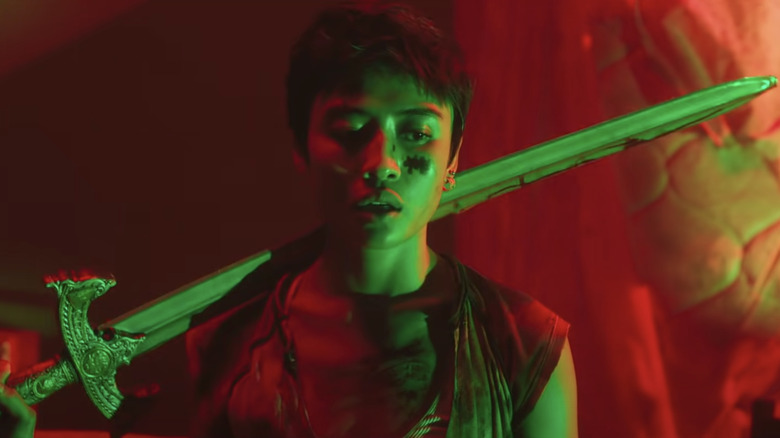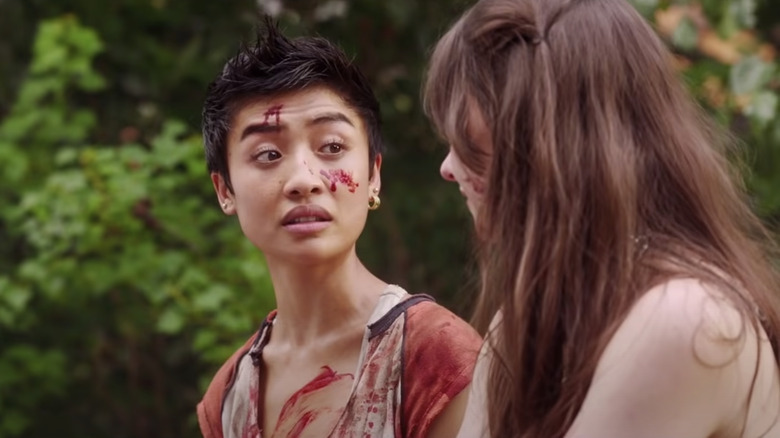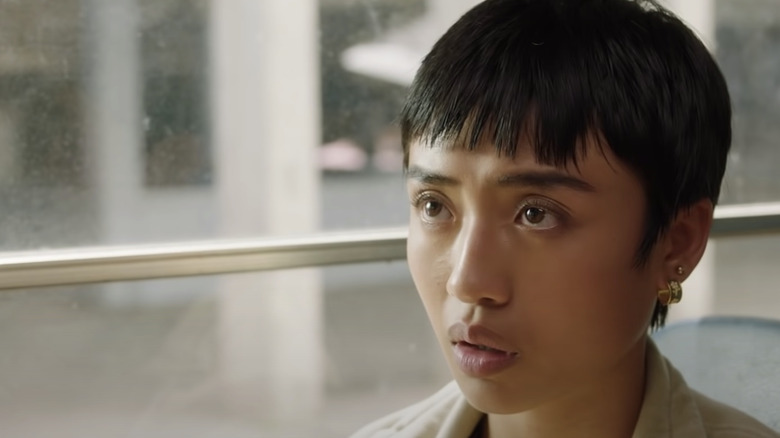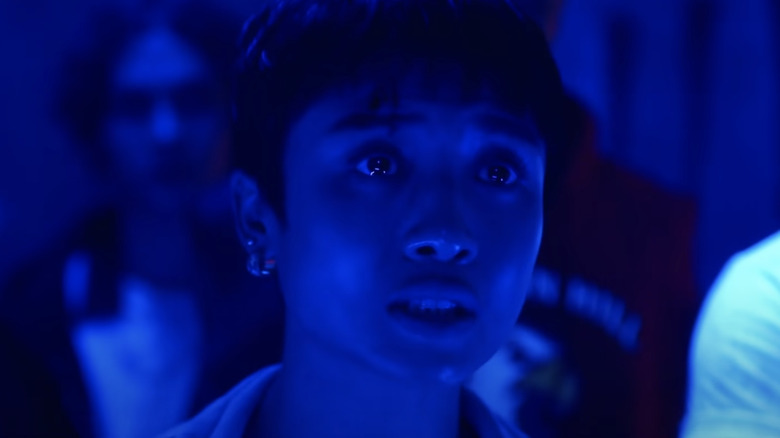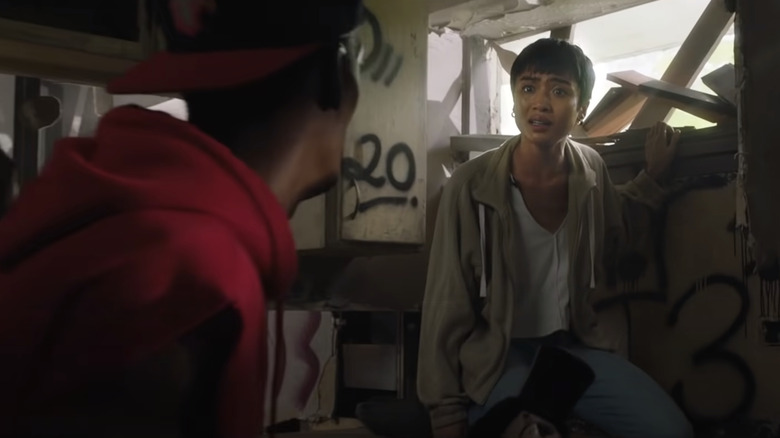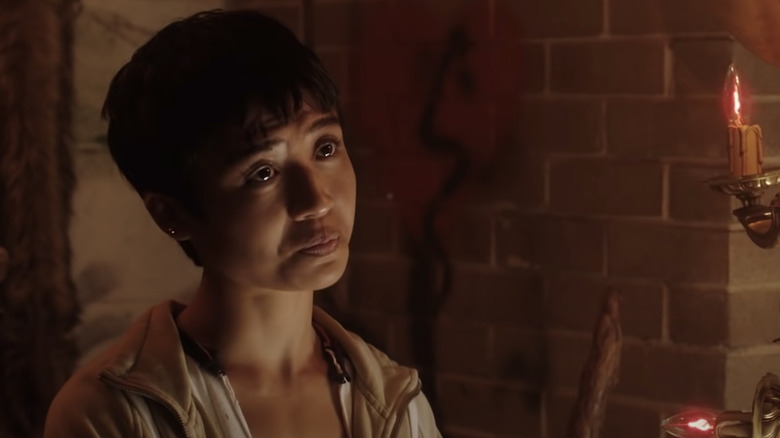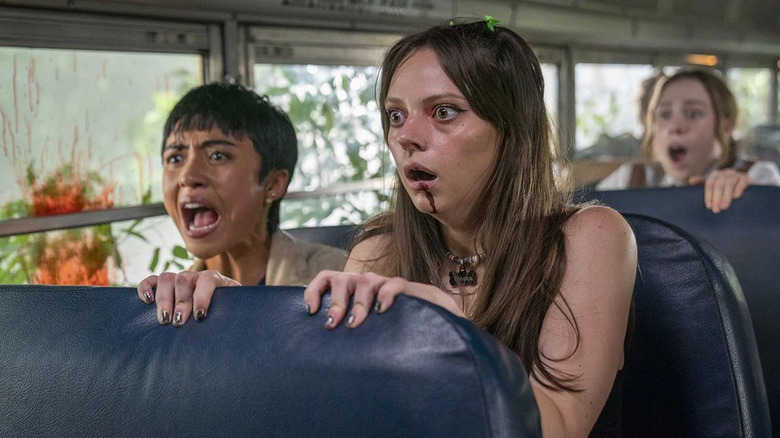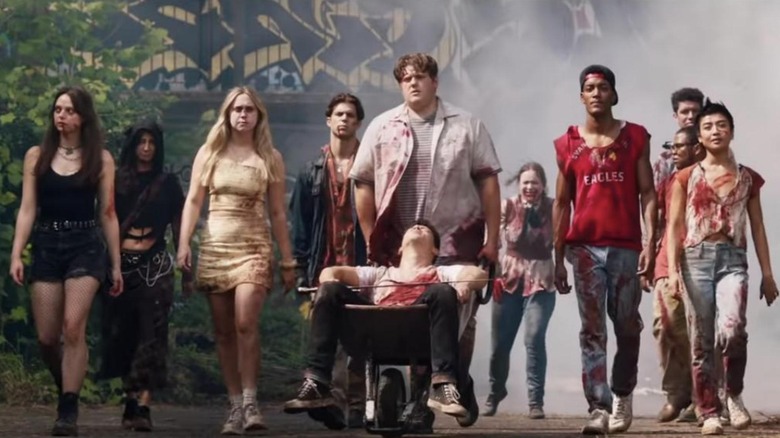Brianne Tju Talks Unhuman, Becoming A Scream Queen, And Teenage Resilience In Horror [Interview]
Brianne Tju knows a thing or two about teen horror, considering she was only 13 years old when she appeared on the R.L. Stine anthology series, "The Haunting Hour." In the years since, Tju has returned to horror repeatedly in projects like "iZombie," "Light as a Feather," "47 Meters Down: Uncaged," and both the "Scream" and "I Know What You Did Last Summer" shows. Now, Brianne has finally been given the opportunity to lead a horror flick with Blumhouse and Epix's "Unhuman" from writer/director Marcus Dunstan and frequent co-writer Patrick Melton.
With a tagline like "The Dead Will Have This Club for Breakfast," it's pretty clear what kind of movie "Unhuman" is going to be. Part John Hughes deconstruction, part zombie survival comedy, "Unhuman" stars Tju as a teenager named Ever, struggling to find her place in the world. On an extra-credit field trip, Ever, her best friend Tamra (Ali Gallo), and a gaggle of classmates from different cliques find themselves in a fight for their lives against what appears to be an infected horde of zombies. Just as pressure can turn a lump of coal into a diamond, Ever now has to find a way to survive — and find herself in the process. In preparation for the release of "Unhuman" on VOD, I chatted with Brianne Tju about becoming a scream queen, what drew her to the film, and why people need to give teenagers a hell of a lot more credit.
Beware: Mild spoilers for "Unhuman" follow.
This interview has been lightly edited for brevity and clarity.
'I have so much fun doing horror movies'
I don't want to laundry list everything that you've done, but you're quickly becoming a scream queen. What is it about horror that keeps you coming back?
I'd be honored to be considered a scream queen. I've always loved horror and it's a genre that, like you said, I've been a part of many times. I think as an actor, it's really fun to be able to go outside the realm of situations that you would normally be in and get to use your imagination. It's the heightened aspect of it. Finding a way to portray the fear and the adrenaline going on while still keeping it grounded and human and relatable is a challenge that I love to grapple with. And it's just like, I have so much fun doing horror movies. Especially Blumhouse. I think that they have a history of doing very interesting horror movies, so it was really great to be a part of this film and horror in general.
This role in particular is a lot different than, say, Margot on "I Know What You Did Last Summer." How do you prepare to go from a character like her, who is a big social media personality but secretly insecure, to this movie where Ever is described as "nothing?" How do you make that shift to have a character that doesn't fall into a lot of these tropes and make them realized?
It's funny because I actually shot this right after — I think I had a week or two in between coming home from Hawaii shooting "I Know What You Did Last Summer" and then into New Orleans to do this project. It was definitely a big switch. I've never really liked relying on tropes when it comes to creating a character. I think maybe that can be the stencil for the character, but there has to be so much more if you're going to do something that feels interesting and also real. People are far more than just whatever facade they put out there, which we did see with Margot.
On saving your own life
Totally.
I think Ever was interesting for me because for everyone else in this film, it's very clear that they're some quintessential stereotypes that we've seen in other high school movies. Ever kind of didn't fall into any of those categories for me. She wasn't even necessarily like a misfit or an outsider. She was literally, like you said, considered "nothing." And she considers herself nothing, which I thought was really sad. And so it was very fulfilling to be able to start there, take from my own life as an Asian-American woman and my experiences in high school and feeling like I just couldn't fit in no matter how much I tried, literally because of the way I was born and my family's heritage, which I'm now so proud of, but taking that and then seeing the transformation that she goes through in her self-realization, her self-love, and trust for herself. And seeing how that not only saves her life, but everyone else's, and she's able to repair her friendship and walk out of this situation much stronger than when she started.
Director Marcus Dunstan is 'an angel on earth'
I was talking with Marcus Dunstan earlier today and noted how this feels like such a departure from his usual horror fare.
Definitely.
When you found out that the guy who made "Saw" movies was the person behind the film, was that intimidating at all?
It was because, I mean, he's just kind of like a horror legend. He is so prolific and he is so unique and cool and stylized. And I remember there wasn't a script yet. There was a script, but it wasn't his script. He was in the process of rewriting it when I was asked to meet with him. And so we met over Zoom and I remember telling my roommate, I was like, "This guy's going to be weird. He's going to be weird. He's super intense. And I mean, like he made 'Saw.' Like, I mean, I don't know, I'm nervous." And then I get on the call and he's the loveliest, nicest, sweetest person I've honestly ever met. I'm obsessed with him. He immediately started pitching me his idea for the film and it had like, sound effects that he was making. And he was like, "The light here is very theatrical." He basically put on a whole play for me. It was amazing. I wish I had recorded it. He really got me excited for this project and I was really excited to work with him and he made sure that there was never any intimidation in this process. Everyone felt safe, supported, and it was extremely collaborative. I really appreciated that from him.
Oh, that's wonderful to hear. That's just a delight to know.
I know. He's an angel. He's an actual angel on Earth.
'Young people are the future'
While you were talking, I was thinking about how there are so many misconceptions or stereotypes that I think people have in terms of teenagers. But as we see in this film, there is such resiliency and a strength to all of these characters — Ever, especially. I was just wondering if you could speak on what it means to play characters that showcase that strength?
We kind of get brushed under the rug like we're stupid or just ignorant or whatever, as if all we care about are dumb things when in reality, we're trying to navigate this world just as much as anyone else. And I think high school's a very formative time for that. We're trying to understand who we are as people. So to see Ever really have this major transformation and this self-realization that trickles to everyone around her, these characters, they show a level of vulnerability that a lot of us are never brave enough to show in our own lives. And the facades they start with get stripped away and they're left with just themselves as human beings. And you get to see them repair relationships, form connections, and they just, like you said, have a resiliency that is very admirable. I think that's honestly pretty true to most young people that I've met. Especially now. I think that young people are the future, the voice, and we're making changes and creating progress in ways that people don't really expect us to, don't give us the credit for. And so I'm proud of that in our film. And in general.
In defense of horror storytelling
I agree with that completely, like 100% across the board. Something else that you mentioned is with Marcus being this horror guy, but actually being like an absolute delight, I think so many people write off horror as a genre as being low-brow, but I think that there's a deeper meaning of why people watch horror. So I'm curious, why do you watch horror?
Yeah. I mean, I watch horror, and especially the types of horror that I'm drawn to tend to be a bit more psychological. But in general, there's strong character work there. There are good performances. There are relationships between the characters that really further a story and a point. I think that finding the balance between the shock factor and the horror and the adrenaline and the real point of the story and getting that across, I think it's those films and those TV shows in terms of horror that I really connect with. And, I mean, if you really look at this film ... I would call them Easter eggs, but I'm not sure if they are. There's a lot of thought that's put into this.
Even if we think about the metaphors in terms of the locations we're in, right? So there's like the welcoming room or the welcome room, and it's kind of like this "rave-esque" room with black light and everything. It kind of signifies that things are not as they seem, and the movie does that with every other location we go into. There's the stained glass room, which shows transparency and Uriah Shelton's character kind of goes through this breakthrough — he kind of ends up telling the truth about himself. It's this transparency that is now being shown. And then there's the clown room, the mannequin room. And I think that really signifies that we all have this facade, these masks on or whatever, and the joke's on us now, and those things are slowly being chipped away. And there's more interesting messages throughout this movie. And I think that the horror genre, although it sometimes, like you said, gets discounted, I think is a very legitimate genre in terms of entertainment, in terms of storytelling.
The bonding element of stuntwork
In addition to this amazing character work that you have as playing Ever, you also have a lot of physicality that you've got to deal with. I mean, you're essentially the final girl, even though obviously we're breaking slasher conventions in this movie, but you get put through the ringer here, physically. How did you prepare for all of that?
Yeah, no one really told me how taxing it was going to be. [laughs] And also, I mean, I guess I should have known, it just didn't occur to me in the moment. We were shooting in New Orleans in June/July, so it was really, really hot. But I love doing stunts. Because you do all this work to figure out the character's look and their backstory and their emotional journey, but there's also a physical element. And when you actually get to step in and do those things, I think it adds to your performance and your connection to the character. We also had just an incredible stunt team. Angel Lia Spitale was my stunt double. She makes me look awesome. I always try to volunteer to do them whenever I can and whenever I'm allowed to and I think it really bonded us as a group as well. Not only was it hot and not only were we running through marshes and forests and warehouses and whatnot, but being in the trenches together like that struggling together really bonded us. And I think that translates to our performances.
The power of female friendships
There definitely seems to be some real camaraderie between all of you and while this is very much a high school movie, it's also one that dismantles tropes. Could you speak on what that was like?
I think that Marcus does such a great job of doing that in this film and all the actors as well. But that's what I really liked about the movie in general, is that we are dismantling tropes. We are flipping everything on its head. We are taking the quintessential John Hughes group of kids and putting them in this anything but ordinary situation and seeing how they react to it. And every character goes through quite a bit of a transformation. But with Drew Scheid and Benjamin Wadsworth's characters, they're the nerds and you kind of expect them to be very sweet and wholesome and not vicious in any way. And I think what it goes to show is that there's a really ugly side to being bullied and being considered an outcast and whatnot. And I think that we are showing the other side of it where they don't triumph in the end. They go and instead of using their struggles and doing something good with it, they do something bad with it. And they get kicked in the ass for it and in a really great way by women. And it was pretty badass if you ask me.
When you get to that part of the script and you know, "Oh man, this is just going to be like a lineup of women just like kicking major ass," what is it like for you as an actor when you know this is a moment you're going to get to participate in?
Well, what's great is that yes, Ever kind of has her big, final battle with Randall. But what's funny is that in the very end, who ends up saving Ever? Ever's on this mission to save everybody, but who ends up saving Ever in the end is this group of women and her best friend. And I think that's a great message, is that female friendship, female support is so important and so, so powerful. It was just a very empowering moment. And as the character, but also as me, Brianne, getting to sit there and watch these women even just act out the scene, it was so cool. I remember Ali, who plays Tamara, and I, I remember us watching or reading this script and just being like, "Wow, this is so cool." It gave us chills. I'm really happy that's a central theme in the film.
"Unhuman" is now available on VOD.
